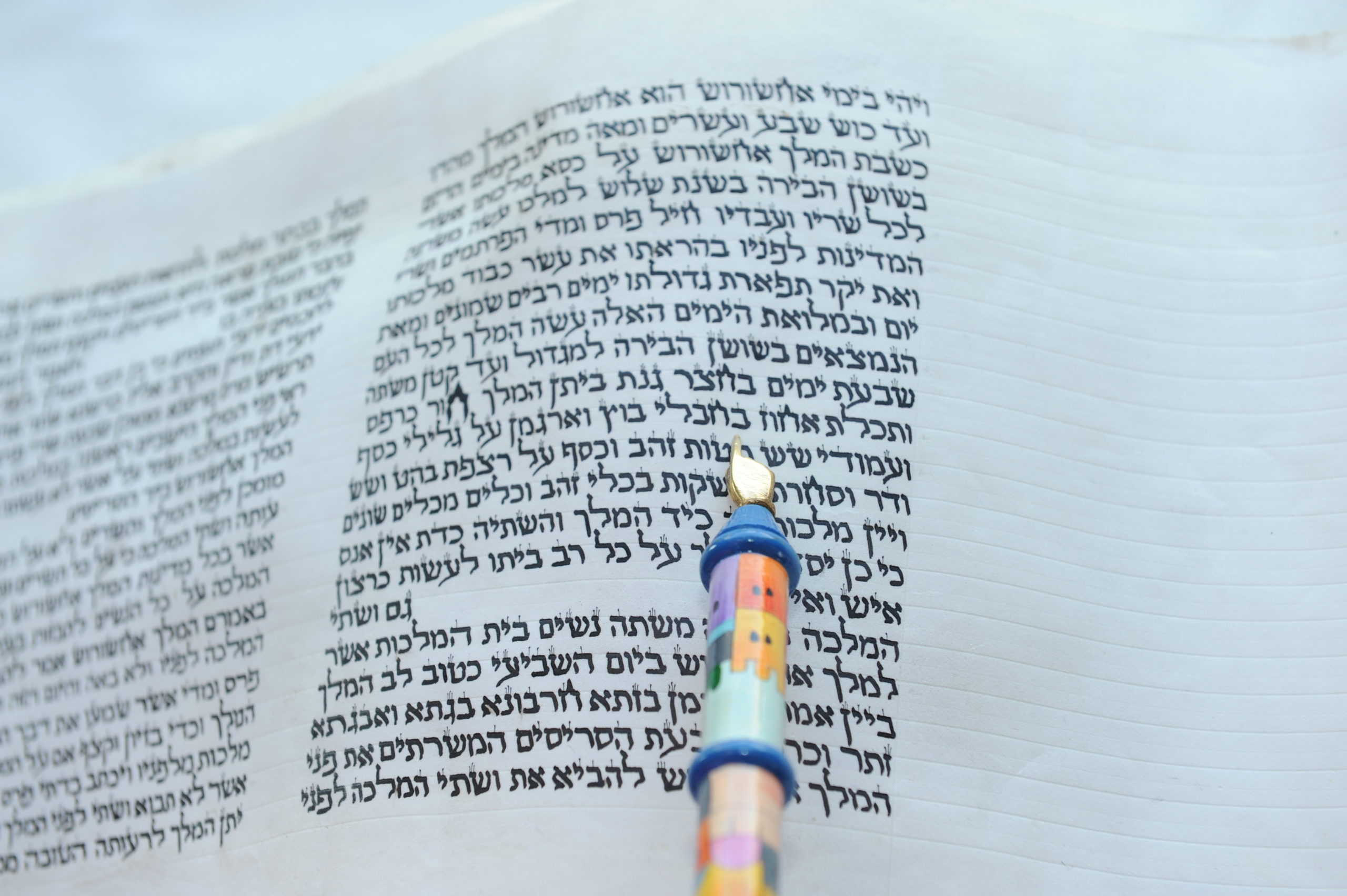
Layning Megillah for My Daughter
As a woman who had been raised in Orthodox synagogues, and who attended a co-ed, modern Orthodox yeshiva day school, I had almost no experience being “on the bima,” and, as a relatively quiet person who mostly eschewed being in the spotlight, I had no particular desire to be there. At my mother’s insistence, I had layned the first chapter of the Book of Ruth at my bat mitzvah, which fell close to Shavuot, and in my modern-Orthodox day school we’d had a few co-ed classes in te’amim, the “musical notes” that indicate how the words and phrases of the Tanach should be chanted. But I’d never layned from a real scroll (which, for the uninitiated, has no punctuation, notes, or guideposts of any kind), as one is supposed to do on Purim.
Had I the inclination, I could have participated in my high school’s women’s tefillah group, but I did not. I’d always considered myself a feminist but not an activist, and that was especially the case when it came to my Judaism. Like many Orthodox women I know, I was largely content to leave my feminist leanings outside when I walked through the door to shul.
So, when I was approached by some other women who wanted to do a women’s megillah reading and asked if I would read a chapter or two, I surprised myself by saying yes. The idea of learning how to layn, from a real scroll without vowels, punctuation or te’amim—and reading in front of a bunch of people, was terrifying. But I realized that if I didn’t step up, no one else would. With a strong background in Hebrew, some musical ability, and even the bit of layning experience I had from my bat mitzvah, I had the skills necessary to do this, and therefore, I had the responsibility to do it.
Like me, many of the women who participated that first year had never layned megillah before, and, truth be told, it was a bit rough going. Our nerves were apparent, one of our more experienced layners had laryngitis and was barely audible. Many of us made mistakes. But it was still magical. There was a palpable feeling, among readers and listeners alike, that we were doing something special. We were stretching ourselves out of our comfort zone, claiming something for ourselves and for all women —the right to read a Jewish text out loud, a story about a Jewish woman rising up to save the day, and to have our voices heard.
Looking back now on that first megillah reading, I realize it was the beginning of a Jewish feminist awakening on my part, which led to a career spent writing and reporting on Jewish women’s issues. It was also the beginning of a personal willingness to step up into the spotlight when needed. Not only am I now a coordinator and frequent layner for Stanton’s Women’s Tefillah group, which now meets several times a year, I am also the president of the synagogue. With all that, you’d think reading megillah would be no big deal by now, but it still is. Every time I layn megillah or chant from the Torah, I have that same feeling of laying claim to something from which I was previously excluded, and raising up my voice in a way that women have traditionally been discouraged from doing.
I think about all of this in light of the current state of our nation. Whatever one’s political beliefs, there is no denying that Donald Trump’s presidency has mobilized Americans to fight for their values. I see how people who were never politically engaged before are attending marches, calling congressional representatives daily, and generally raising their voices up to make their views known. All of this, of course, is being done out of fear that basic American values once taken for granted – tolerance, liberty, justice for all—are being eroded.
In some ways, having a baby is a distraction from all the political tumult. When she wakes in the middle of the night, it’s because she’s hungry and not to share her views of the president’s latest tweet. But every new conflict reminds me that the country—and the world—are not how I wish they would be for my daughter’s future. My prayer for her, this Purim and always, is that she uses her voice, stands up for what she thinks is right, and acts on behalf of others’ welfare in addition to her own. And that she does these things not out of fear but hope and confidence in her ability to make the world a better place.
That’s what I’ll be thinking about from the bima this year.
The Stanton Street Shul’s Women’s Megillah Reading will begin on Saturday night, March 11, at 7:10pm. The Stanton Street Shul is located at 180 Stanton St on the Lower East Side.
The views and opinions expressed in this article are the author’s own and do not necessarily reflect those of Lilith Magazine.
2 comments on “Layning Megillah for My Daughter”
Comments are closed.




Yasher koach!
You’ve written a beautiful piece! May our children inhabit a kinder and more thoughtful world.